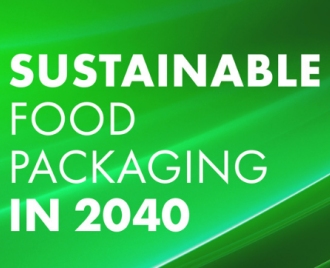
 The industry anticipates the global share of fibre-based materials are projected to contribute to over 40% of all materials in use for food packaging over the next two decades.
The industry anticipates the global share of fibre-based materials are projected to contribute to over 40% of all materials in use for food packaging over the next two decades.
May 17, 2022 - A key trend that emerges from a study commissioned by UPM Specialty Papers is that while recycling, reuse and composting of packaging will all increase significantly, a fifth of all food packaging could still find its way to landfill and incineration even in two decades time.
Today, food packaging is predominantly plastic and recycling rates are relatively low. While, fibre-based packaging is widely recycled in non-food uses, the industry believes that by 2040 fibre-based packaging will approach circularity as technical development broadens its suitability for food packaging. Recycling rates for plastics are also projected to grow.
"The packaging industry will focus research and development efforts to meet increasing consumer and regulatory demand for more recyclable and compostable packaging", believes Maria Saloranta, Vice President, Strategy for UPM Specialty Papers. "As a result, we expect the share of fibre-based food packaging to grow, accelerated by breakthroughs in barrier properties and use of smart technologies that help relay information to consumers quickly and easily".
In the report, more than 200 global packaging professionals from across the value chain contributed to the first-ever collective assessment of key trends that are projected to drive sustainability in the food packaging industry by 2040. The industry anticipates the global share of polymer-based packaging will fall by half over the next two decades in sustainable food packaging applications, while fibre-based materials are projected to contribute to over 40% of all materials in use for food packaging.
"The survey shows the industry is anticipating a USD 20 billion-dollar shift from polymer-based to fibre-based packaging by 2040," notes Ciaran Little, Global VP of Business Development, Smithers. "The use of polymer packaging will not be eliminated but will focus on robust applications in which high strength barrier requirements and reusability are critical."
UPM Specialty Papers and consultancy firm Smithers surveyed 200 global packaging experts across the value chain to find out key trends driving the development of sustainable food packaging by 2040. The study assessed the impact of a range of consumer expectations, regulatory development, material choices, to end-of-life options on the future of food packaging. The study is available for download on UPM's website: www.upmspecialtypapers.com/sustainable-packaging/sustainable-food-packaging-trends-2040/#download-report.
UPM delivers renewable and responsible solutions and innovate for a future beyond fossils across six business areas: UPM Biorefining, UPM Energy, UPM Raflatac, UPM Specialty Papers, UPM Communication Papers and UPM Plywood. To learn more, visit: www.upm.com.
SOURCE: UPM
Paper Industry Newsletter
Stay on top of paper industry news
from around the world with
PaperAge's free weekly newsletter.
Delivered every Thursday.
Sign up today!